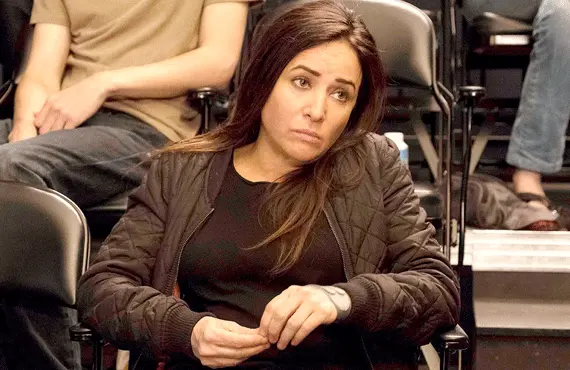Better Things Embraced Aging For Its Most Remarkable Season Yet
-
 Pamela Adlon stars in Better Things (FX)
Pamela Adlon stars in Better Things (FX)“We age out of our men like kids age out of the foster care system,” quips Sam Fox (Pamela Adlon) in a Season 3 episode of Better Things . In between swills of wine, flirty exchanges with a younger, handsome waiter, and lines of cocaine, Sam and her friends lament the changes in their love lives, their bodies, and their families. A moment like this does not seem out of place for Better Things, a show that always brilliantly explored the virtues and shortcomings of modern American life, but in its third season, which wraps up this week, the show seems to have taken a particular interest in what aging does to us as parents, lovers, and people. It’s not that age and generational gaps haven't been on the show's mind before; those are concepts and concerns that have been very much baked into the DNA of the show. But it seems this season, sometimes ever so slyly, Adlon and company have really leaned into this kind of storytelling.
What made this theme more prevalent in Season 3 was an increased serialization of the storylines. In the past, with the show's more weekly then seasonal meditations on a theme, something could happen in one episode and never be brought up again. This season, we found Sam struggling with her authority and stature while on set of a disastrous horror movie, a set filled with younger creatives who didn't seem to have much investment in the work they’re doing. Sam, a semi-famous actress since childhood, knows that the poor working conditions on set are unfair and offensive, yet no one really wants to hear her out on it. When she's asked to do an extremely dangerous stunt (eerily similar to the one described by Uma Thurman on the set of Quentin Tarantino's Kill Bill ) she finally snaps and her complaints still fall on deaf ears.
As our culture continues to grapple with the a heightened awareness that women have been treated horribly in a litany of ways in every industry, this season has seen many television shows explore sexual misconduct or harassment (and with good reason). But Better Things resists the temptation to make Sam’s work violations overtly sexual, while always recognizing the role her gender disadvantage plays. The treatment she receives stems from the fact that her industry has grown out of needing her, evoking a truth for many women of Sam’s age all over the world. On the flip side, the season offers a respite in the form of an episode that explores the communal bond among actors during a play reading, particularly highlighting veteran actors (Holland Taylor, Norm Lewis, Mark Feurstein) who've each trod the boards for a long time.
The contradictions of age are given voice in Sam’s personal life, as well. She, along with her youngest daughter Duke (Olivia Edward), are haunted by appearences from the ghost of Sam’s father when he was a younger man. An entire episode is dedicated to the trials and tribulations of a colonoscopy. Sam discovers she’s in menopause after experiencing persistent hot flashes, and begins seeing a therapist after suffering from rape dreams about her ex-husband. Her therapist, played by Matthew Broderick, turns out to be a former friend from childhood and the two begin seeing each other despite their patient/doctor relationship. All of these threads — ex-husbands, old friends, fluctuating health — are all entangled in one another. The future is sometimes just a regurgitated version of all the junk from your past, and the past might show up as a ghost or a therapist. The aforementioned presence of Broderick and other guest stars (including the incomparable Sharon Stone) also play on the audience’s relationship to the past. What does it do to our associations of people from our past that we knew so vividly in one way — the bombshell movie star, the cocky high-school babyface next door — when they become our ex’s new lover or our new therapist?
It hasn't been all doom and gloom for Sam Fox, however. A beautiful storyline that runs through the season is her will-they-won’t-they relationship with a younger female talent manager (Marsha Thomason). While they never consummate their relationship, Sam does use their flirtation as a way to pleasure herself, discovering new areas of her sexuality and desire. On the family side of things, her children and her mother are experiencing some of the more familiar parts of their respective ages. Her oldest, Max (Mikey Madison), runs off to college with great anticipation only to find herself unfulfilled. Duke gets her period, Frankie (Hannah Alligood) begins to discover her voice through slam poetry at school, and Phyllis (Celia Imrie) struggles to assert herself in her new boyfriend’s family. (Another brilliant piece of casting is Margaret Avery, so alive and vivacious in The Color Purple , as Phil’s boyfriend’s Alzheimer’s-afflicted wife.)
All of this just scratches the surface of what made the third season of Better Things such a remarkable, deeply resonant season of television. Every episode had a moment (or several) that could bring you to your knees. Looking back on the season, it’s hard to find just one moment that represents these thirteen episodes so beautifully, but one that comes close happens at the end of the season premiere, as a jet-lagged Sam comes home from dropping Max off at college and reads A Raisin in the Sun to Frankie, set to the beautiful strains of Rod Stewart’s “Mandolin Wind.” The past, present, and future of a culture, a country, and a family, all present in that one room..
People are talking about Better Things in our forums. Join the conversation.
Stephen Hladik is a freelance culture writer and actor. You can follow him on Twitter @stephen_hladik
TOPICS: Better Things, FX, Matthew Broderick, Pamela Adlon